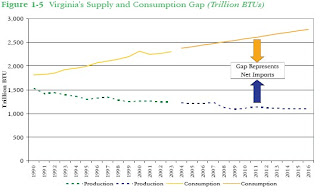 According to the recently released Virginia Energy Plan, Virginia suffers from a major energy gap: We consume far more BTUs of energy than we produce. As the report notes, “Virginia’s energy production is expected to decrease over time as the amount of coal mined in Virginia decreases. This will result in a growing gap between what Virginians use and what the state produces and will increase the drain on Virginia’s economy through increased payments for imported energy.”
According to the recently released Virginia Energy Plan, Virginia suffers from a major energy gap: We consume far more BTUs of energy than we produce. As the report notes, “Virginia’s energy production is expected to decrease over time as the amount of coal mined in Virginia decreases. This will result in a growing gap between what Virginians use and what the state produces and will increase the drain on Virginia’s economy through increased payments for imported energy.”
The Energy Plan does not provide a dollar value for that gap, but we can infer (assuming energy expenditures account for roughly 10 percent of Virginia’s $319 billion 2006 gross domestic product) that we could be talking about a $15 billion economic impact.
Narrowing that gap is a goal of the energy plan, which calls for a combination of conservation, energy-efficiency and energy-production initiatives. The plan publishes the following goals to achieve by 2017:
- Reduce the rate of growth of energy consumption by 40 percent of the currently anticipated increase in per capita energy use, effectively keep per capita energy use stable.
- Increase in-state production of energy by 20 percent over what is currently projected, including investment in electric generating capacity, bio-fuels, coal and natural gas distribution capacity.
In future posts, I will delve into the details of how the energy plan proposes to meet those goals. Here is my question at the outset: Does it matter if Virginia has an “energy” gap any more than it matters that we might have a gap in bulldozers, cashews, hedge funds or any other product/service? As long as Virginians produce things that others don’t — microchips, cigarettes, automated controls, IT services — and as long as we can trade those things for energy, why does the gap matter? One could argue that investing public dollars in closing the gap would skew resources towards less efficient economic uses, thus creating a net loss to the economy. Is the Virginia Energy Plan nothing more than a state-level industrial plan in which politicians and bureaucrats pick winners and losers?
I would argue that energy is different from tobacco, microchips and wireless technology companies in three important ways. First, dependence upon foreign sources of oil makes us uniquely vulnerable to hostile countries that would use oil as a political weapon against us, and vulnerable to supply disruptions in unstable parts of the world. Second, the production of energy in whatever form has adverse consequences on the environment (although, clearly, some sources of energy are more benign than others). Third, the state already regulates the electric power industry; it only makes sense to articulate what goals we hope to achieve through that regulation.
Bottom line: The Virginia Energy Plan is a legitimate endeavor, not another exercise in the state meddling where it doesn’t belong. Coming up… Conservation and energy efficiency.


